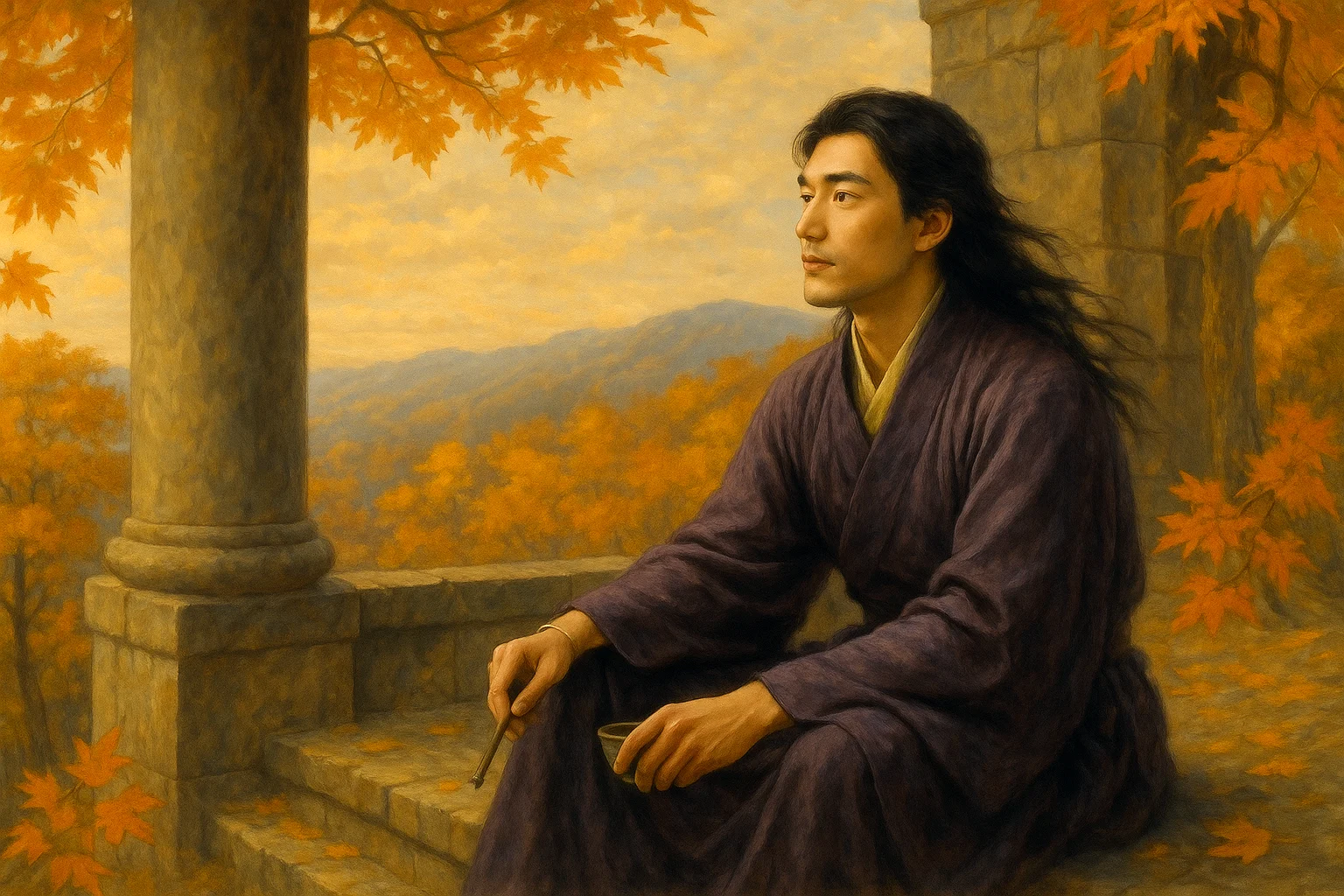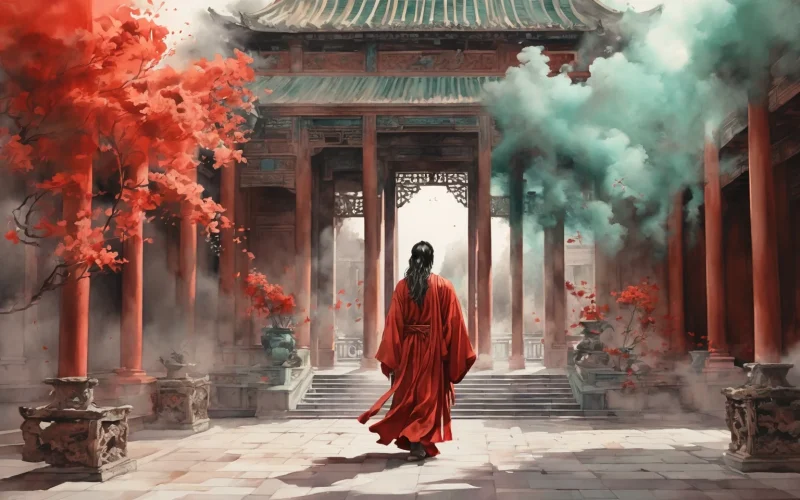The garden-temple fell in years untold,
Yet this ancient mound still greets my hold.
Lonely village, days of quietude,
Ceaseless rains now find their interlude.
Once facing Qin peaks' steadfast might,
Where Han emperors sought delight.
Who could foresee a thousand years away,
All things would flow like water astray?
Original Poem
「登乐游原」
耿玮
园庙何年废,登临有故丘。
孤村连日静,多雨及霖休。
常与秦山对,曾经汉主游。
岂知千载后,万事水东流。
Interpretation
Composed during the mid-to-late Tang Dynasty, this work reflects Geng Wei's signature melancholic contemplation as one of the Ten Literary Masters of the Dali period. Leyou Plateau, southeast of Chang'an, once served as an imperial retreat where Sui and Tang emperors held grand ceremonies amidst its lush gardens and temples. By the mid-Tang era, these glorious sites had decayed into ruins, their desolation becoming a canvas for meditations on historical transience. Geng Wei's ascent to these ruins evokes profound reflections on the cyclical nature of dynastic fortunes.
First Couplet: "园庙何年废,登临有故丘。"
Yuán miào hé nián fèi, dēng lín yǒu gù qiū.
When did these pleasure gardens and altars crumble?
This climb reveals only memorial mounds of past splendor.
The opening couplet establishes the poem's elegiac tone. The rhetorical "when did they crumble?" hangs suspended between memory and decay, while "memorial mounds" transforms physical ruins into monuments of historical consciousness. The poet's ascent becomes a temporal bridge, inviting readers to witness the palimpsest of time.
Second Couplet: "孤村连日静,多雨及霖休。"
Gū cūn lián rì jìng, duō yǔ jí lín xiū.
lonesome hamlet's unbroken silence;
The season's persistent rains at last abate.
Here, atmospheric precision conveys existential solitude. "Unbroken silence" suggests both the absence of human activity and nature's mute witness to history. The ceasing rains create a liminal moment - neither storm nor sunshine - mirroring the plateau's suspended state between remembrance and oblivion.
Third Couplet: "常与秦山对,曾经汉主游。"
Cháng yǔ Qín shān duì, céng jīng Hàn zhǔ yóu.
Eternity dwells in these peaks facing Qin ranges,
Where Han sovereigns once reveled in mortal glory.
This masterful juxtaposition contrasts geological permanence with human ephemerality. The enduring mountains stand as silent judges of dynastic cycles, while the past participle "once reveled" echoes with the ghosts of imperial merriment. The spatial "facing" and temporal "once" intertwine to create a stereoscopic view of history.
Fourth Couplet: "岂知千载后,万事水东流。"
Qǐ zhī qiān zǎi hòu, wàn shì shuǐ dōng liú.
Could those golden-age revelers have conceived
How their triumphs would dissolve like dawn mist
Upon time's irreversible current?
The closing transforms historical reflection into metaphysical inquiry. The rhetorical question underscores human myopia against temporal vastness, while "dawn mist" and "irreversible current" create a double metaphor of evanescence. The enjambment mimics the flowing water described, carrying both the poem's imagery and the reader's contemplation downstream into silence.
Holistic Appreciation
This is a quintessential example of historical meditation poetry, where the poet interweaves present landscapes with echoes of the past, lamenting the transience of glory and the inevitability of decline. The opening couplets depict the desolation of Leyou Plateau, its abandoned temples and silent villages evoking an atmosphere of solemn ruin. The latter stanzas then shift to historical contemplation—invoking the Qin mountains and Han emperors as symbols of bygone grandeur, while the eastward-flowing waters become a metaphor for the ceaseless passage of time and the futility of mortal endeavors.
Without overt emotional outbursts, the poem imbues every line with quiet melancholy. Through the lens of a single ruined mound, the poet reflects on the rise and fall of dynasties, blending stark realism with philosophical detachment. The tone is restrained yet profound, carrying both the weight of historical insight and a transcendent, almost elegiac, resignation.
Artistic Merits
- Layered Imagery, Emotion Woven into Landscape: Geng Wei masterfully anchors emotion in scenery—descriptions like "crumbling ancestral shrines," "lonely villages in stillness," and "mountains emerging after rain" serve as portals to historical reflection, merging the tangible with the intangible.
- Precision and Subtlety in Language: The verses are terse yet resonant, employing parallelism and understatement to amplify meaning. The line "All things drift east with the river"—a seemingly conventional metaphor—gains monumental gravity through the poem’s cumulative power.
- A Historian’s Melancholy: The work pulses with a keen sense of historical impermanence, transforming personal sorrow into a cultural elegy for lost golden ages.
- Controlled Rhythm, Meditative Tone: The steady cadence and restrained rhyme scheme mirror the poet’s contemplative mood, enhancing the poem’s haunting emotional pull.
Insights
This poem invites deep meditation on the cycles of history and human fragility. Standing atop ruins that once witnessed splendor, the poet’s clear-eyed gaze exposes the vanity of power and ephemeral triumphs. It reminds us to cherish the present, embrace humility, and recognize that true legacy lies not in fleeting glory but in the wisdom to perceive life’s impermanence. In just a few lines, Geng Wei distills a philosophy of history—one that lingers long after the words fade.
About the poet

Geng Wei (耿湋, dates unknown), a Tang dynasty poet from Yongji, Shanxi, was among the "Ten Great Talents of the Dali Era." Renowned for his mastery of five-character regulated verse, his poetry is distinguished by its economical diction and tranquil imagery. While the prevailing style of Dali poetry tended toward austerity and desolation, Geng Wei developed a distinctive voice marked by understated naturalism.











